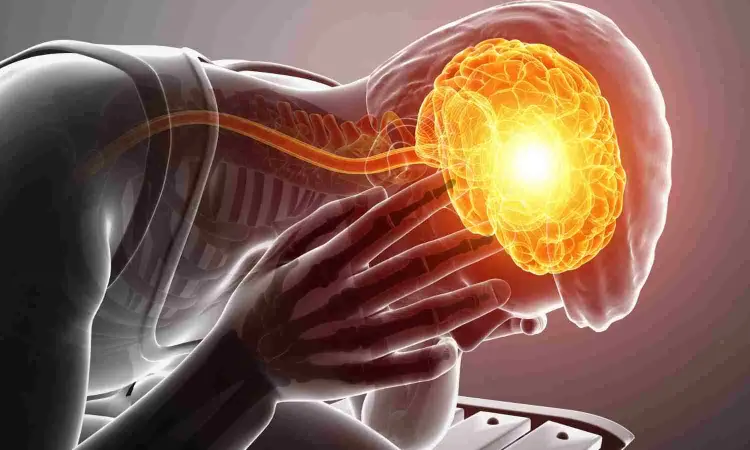- Home
- Medical news & Guidelines
- Anesthesiology
- Cardiology and CTVS
- Critical Care
- Dentistry
- Dermatology
- Diabetes and Endocrinology
- ENT
- Gastroenterology
- Medicine
- Nephrology
- Neurology
- Obstretics-Gynaecology
- Oncology
- Ophthalmology
- Orthopaedics
- Pediatrics-Neonatology
- Psychiatry
- Pulmonology
- Radiology
- Surgery
- Urology
- Laboratory Medicine
- Diet
- Nursing
- Paramedical
- Physiotherapy
- Health news
- Fact Check
- Bone Health Fact Check
- Brain Health Fact Check
- Cancer Related Fact Check
- Child Care Fact Check
- Dental and oral health fact check
- Diabetes and metabolic health fact check
- Diet and Nutrition Fact Check
- Eye and ENT Care Fact Check
- Fitness fact check
- Gut health fact check
- Heart health fact check
- Kidney health fact check
- Medical education fact check
- Men's health fact check
- Respiratory fact check
- Skin and hair care fact check
- Vaccine and Immunization fact check
- Women's health fact check
- AYUSH
- State News
- Andaman and Nicobar Islands
- Andhra Pradesh
- Arunachal Pradesh
- Assam
- Bihar
- Chandigarh
- Chattisgarh
- Dadra and Nagar Haveli
- Daman and Diu
- Delhi
- Goa
- Gujarat
- Haryana
- Himachal Pradesh
- Jammu & Kashmir
- Jharkhand
- Karnataka
- Kerala
- Ladakh
- Lakshadweep
- Madhya Pradesh
- Maharashtra
- Manipur
- Meghalaya
- Mizoram
- Nagaland
- Odisha
- Puducherry
- Punjab
- Rajasthan
- Sikkim
- Tamil Nadu
- Telangana
- Tripura
- Uttar Pradesh
- Uttrakhand
- West Bengal
- Medical Education
- Industry
New drug atogepant to prevent migraine may start working right away, reports research

A drug recently approved to prevent migraine may start working right away, according to a study published in the December 23, 2024, online issue of Neurology®. The study looked at the drug atogepant, which is a calcitonin gene-related peptide (CGRP) receptor antagonist taken by mouth.
“With many current drugs to prevent migraine, it takes time to find the right dosage for the individual and it can take weeks or even months for it to be most effective,” said study author Richard B. Lipton, MD, of Albert Einstein College of Medicine in the Bronx, New York, and a Fellow of the American Academy of Neurology. “Some people give up and stop taking the drugs before they reach this point. Plus, many people experience side effects with current treatments. Developing a drug that works both effectively and quickly is critical.”
In the study, people taking the drug atogepant were less likely to have a migraine on the first day of taking the drug compared to those taking a placebo. They also had fewer migraines per week during each of the first four weeks of the study and fewer migraines during the study overall than those taking a placebo.
For this study, researchers looked at the data from three trials on the safety and effectiveness of atogepant over 12 weeks to focus on how rapidly improvements appeared. The ADVANCE trial, which enrolled people with episodic migraine, had 222 people taking the drug and 214 taking placebo. The ELEVATE trial, which enrolled people with episodic migraine who had previously not responded well to other oral preventive treatments, had 151 on the drug and 154 on placebo. The PROGRESS trial, which enrolled people with chronic migraine, had 256 on the drug and 246 on placebo.
People with episodic migraine experience up to 14 migraine days per month. People with chronic migraine experience at least 15 days with headache per month, with at least eight days being characteristic of migraine.
On the first day of the study, 12% of those taking the drug in the first trial, the ADVANCE trial had a migraine, compared to 25% of those taking placebo. In the second trial, the ELEVATE trial, the numbers were 15% and 26%. For the third trial, the PROGRESS trial, the numbers were 51% and 61%.
When researchers adjusted for other factors that could affect the rate of migraine, they found that people taking the drug were 61% less likely to have a migraine in the first trial, 47% less likely in the second trial, and 37% less likely in the third trial.
For the first two trials, the people taking atogepant had an average of one fewer day with migraine per week, compared to an average of less than one-half day fewer per week for those taking the placebo. For the third trial, average migraine days per week declined by about 1.5 days for those taking the drug compared to about one day for those taking the placebo.
The people taking atogepant also showed improvement on assessments of how much migraine impaired their activities and their overall quality of life compared to people taking the placebo.
“Migraine is the second-leading cause of disability in the overall population and the leading cause of disability in young women, with people reporting negative effects on their relationships, parenting, career and finances,” Lipton said. “Having a treatment that can act quickly and effectively addresses a key need.”
A limitation of the study is that it involved mostly female and white participants, so the results may not apply to the overall population.
Reference:
Richard B. Lipton, Early Improvements With Atogepant for the Preventive Treatment of Migraine Results From 3 Randomized Phase 3 Trials, Neurology, https://doi.org/10.1212/WNL.0000000000210212.
Dr Kamal Kant Kohli-MBBS, DTCD- a chest specialist with more than 30 years of practice and a flair for writing clinical articles, Dr Kamal Kant Kohli joined Medical Dialogues as a Chief Editor of Medical News. Besides writing articles, as an editor, he proofreads and verifies all the medical content published on Medical Dialogues including those coming from journals, studies,medical conferences,guidelines etc. Email: drkohli@medicaldialogues.in. Contact no. 011-43720751


